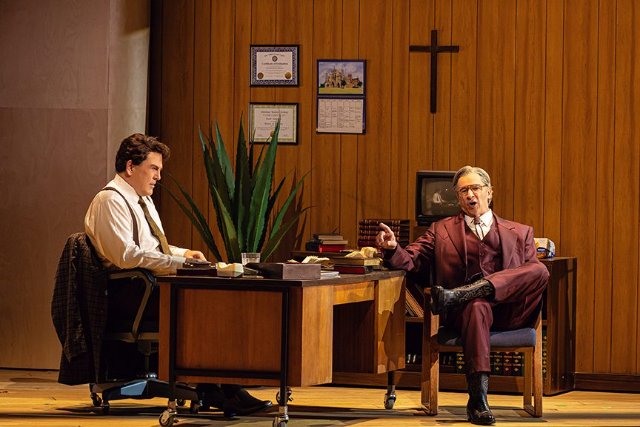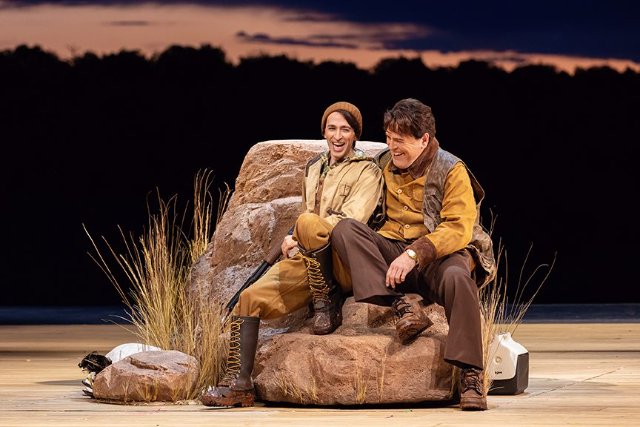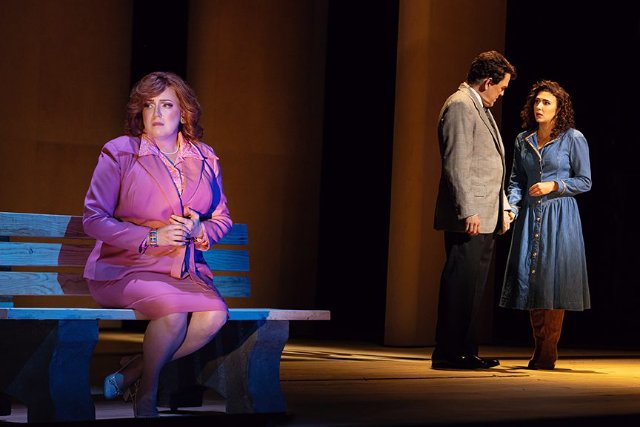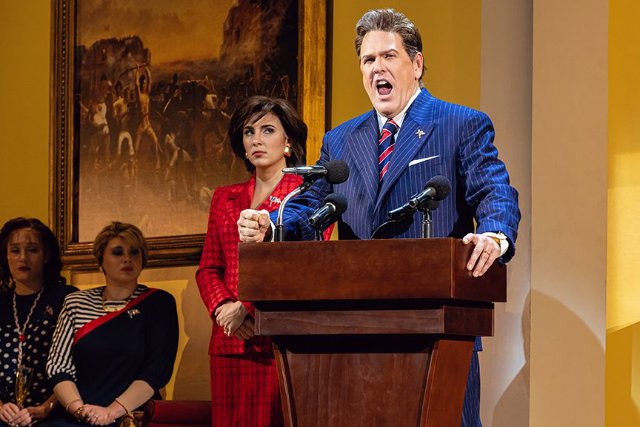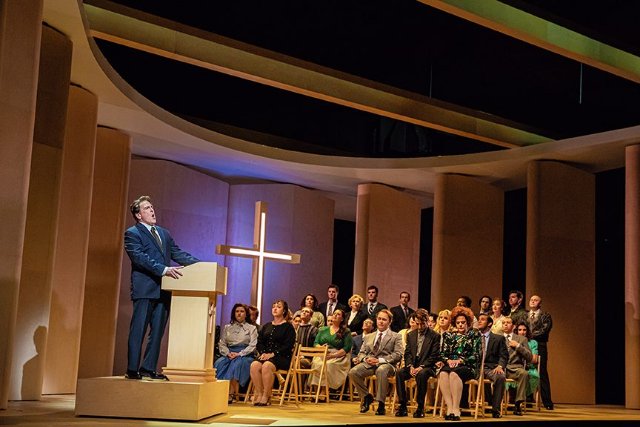The Righteous
Outstanding World Premiere Commission from Santa Fe Opera
By: Victor Cordell - Aug 14, 2024
Santa Fe Opera maintains its position as perhaps the foremost summer festival of opera in the United States and as a font for new works. For the 2024 season, it has commissioned “The Righteous,” composed by Gregory Spears with libretto from past U.S. Poet Laureate Tracy K. Smith. The work indicts a large subculture that pervades much of this country, and the production compels and delights on all artistic fronts, from its fine ensemble cast to its versatile and effective staging. Despite areas for improvement, “The Righteous” is a welcomed addition to the opera canon.
Those of us who grew up in the last half of the 20th century in the underbelly of western religiousity, basically red-state America, will perhaps be more familiar with the themes and the characters that populate “The Righteous.” The recurring refrain “Oh, Lord; Oh hope; Oh might” reflects an expressed subservience to Christian teachings, but actions will belie words in fiction and reality. The notion of patriarchal beneficence mixed with unbounded hypocrisy permeates that society. And the penetration of religious thought into all aspects of life is attested by the hunting scene at the opening in which a prayer is requested to begin a turkey shoot. If there is a god, does it really care whether you bag a turkey or buy one at the grocery store?
David, portrayed by highly convincing and masterful baritone Michael Mayes, represents a class of pastors who aspire to more than serving their flock, but for wealth, power, and/or recognition. One would anticipate that real-world unfulfilled promises and moral corruption of so many religious leaders would impact their appeal to adherents. Yet, public exposure of acute failings of fallen ministers are quickly forgotten - Jimmy Swaggart, Jim Bakker, Jerry Falwell Jr., Robert Tilton (“top 20” televangelist whose shams were exposed by ABC’s “20/20,” and a personal friend of mine for a time during our late teens), and others. The power of identity faith and its associated identity politics make followers seem impermeable to fact, reason, or compromise.
The place of this opera is unnamed, but by connecting the dots, that place would be Texas, on the edge of the Bible Belt. Although the composer Spears is from Virginia, the other bookend of the evangelical South, the librettist Smith would not seem a natural for this scenario. She was reared in the Bay Area of California, has lived in the northeast as an adult, and she is black. Despite these anomalies, Smith has crafted a thoroughly convincing sense of the 1980s and of the white-dominated evangelical world. Importantly, key characters are not cardboard cutout caricatures, but nuanced individuals with good and bad in them. Yet one deficiency that overpowers this whole society is the inability of most of its denizens to either realize or accept the damage that their falseness causes.
The opera captures the macho, Machiavellianism of the politics in the region, especially in the stereotypical Paul Ward. Portrayed with great bravado by the acclaimed Greer Grimsley, Paul, who becomes governor is the classic red-meat and bourbon glad-hander driven to overpower competition.
More importantly, the mindset of the true believer, David, is first revealed as he evolves from being a non-religious youth whose best friend Jonathon is gay to a preacher committed to good works. As Jonathon, Anthony Roth Costanzo is in fine countertenor form and also drops into lower voicing effectively, as the composer requires dramatic leaps and plunges from several singers. It is in his good works period that David somewhat cynically marries Michele (wonderfully mellow and powerful mezzo Jennifer Johnson Cano who displays considerable range), whom he grew up with and doesn’t love, but who is the daughter of influential Paul.
Meanwhile, David becomes so absorbed with religion that he attributes all of his actions including his ambition to divine guidance. Even admitting to sins of the flesh when he has an affair with Sheila, (an impressive warm, yet full-voiced soprano Elena Villalón) who would become his second wife, he submits that it is God’s will. But when he becomes governor and must issue policies that affect primarily gay and black populations, his decisions are driven by political expediency, not his prior practices or Christian teachings.
The broader issue raised by David’s self-indulgence at the expense of following the teachings of Christ is the cognitive state of the kind of person he represents. Does that person truly believe that their actions are ordained from above, or is it a convenient cover to allow the latitude to do whatever the person wants? In the end, David begins to question the person he has become and repeats the refrain “Life is long; wisdom is slow,” yet he still looks for external explanations rather than within himself. Conversely, Michele and Sheila, both of whom become alienated from David when he deserts his roots, undergo sincere transformations. All three are complex and well-developed characters.
One unusual aspect of “The Righteous” is the breadth of issues covered, including many aspects of religion and politics of the day, AIDS, mixed marriage, spousal and child abuse, crack cocaine, youth rebellion and counterculturalism. Traditional operas usually focus on one or two main issues. Although the libretto could be trimmed by a couple of issues and the run time shortened, the fact remains that patrons often look for relevance in entertainment, and that can entail complexity. David’s (and our) world is not as straight-forward as a single-variable experiment in a petri dish, but rather a radically open environment, with influences coming from all directions. This opera integrates important external elements into a personal narrative.
Musically, it is a pleasure to hear sonorous, tonal music in a contemporary opera composition. The Jordan de Souza conducted orchestra fills the bill with a balanced and mellifluous backing. Vocal music is suitable but not memorable. Much of it is in recitative or arioso style, but there are several nice ensembles and arias, primarily given to the female leads who have particularly large and critical roles given the central themes. Although arias are constructed with notable dynamics, the overall volume is usually on high, and could be lowered more for the reflective passages. One split trio with the three central figures is exceedingly well written and delivered. Choral pieces are important, and the chorus, comprised of apprentices (read – talented early career singers) is excellent. It opens the opera with a psalmic-like humming chorus and closes with a rich Revelations-like ending having the crashing power of the old Memorex commercial in which the sound waves blow your hair back.
The dramatic arc and characters of “The Righteous” are involving and realistic throughout, and the whole closing scene pulls emotionally. Truly impressive.
Also deserving of some commentary is the venue. Santa Fe Opera, isolated from major population centers, has no right to be a world class company, but it is. Visiting should be on the wish list of every opera lover. The setting with vistas of the Sangre de Cristo Mountains is mystical. The striking architecture of the opera house with sides open to nature is unique. When the back wall of the stage is open, as it is in parts of this production, the rugged yet majestic view of desert mountains behind enhances the staging. No opera atmosphere matches the special ambiance of Santa Fe Opera, and the town and surroundings have a host of assets from fine restaurants to fine arts and activities in nature.
“The Righteous,” composed by Gregory Spears with libretto by Tracy K. Smith is a world premiere commission by Santa Fe Opera and played at its opera house at 301 Opera Drive, Santa Fe, NM through August 13, 2024.

